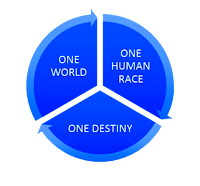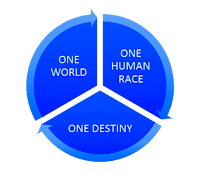Can Some African Countries Escape the Virulence of 'Tribalistic' Governments?
Africa, it seems, is cursed by the destructive tribal and/or ethnic factors which are at play in the governments of some of the Continent's governments. This is the case amongst the territorially and/or demographically largest as well as the smallest countries. We see tribal and ethnic factors at play in large countries such as South Africa, Nigeria, and the Central African Republic, and we see them in smaller countries such as Libya, Mali, and the newly created South Sudan.
Whereas social and class statuses are used in more developed countries, some lesser developed African countries are stratified along ethnic, 'tribal', and religious lines as well. All countries, whether developed or lesser developed, have established factors which determine their citizens' standing in the social, economic, political and ethnic pecking order. Probably the main difference between the social order in some African countries and their European and more westernise counter-parts, is the extent to which people's status is not largely impacted on by any adherence to feudal attributes, such as the standing of the Chief, the Imam, nepotism and the extent of corruption in government.
Some of these ethnic and/or tribal groups are entities comprising tens of millions of people - such as in Nigeria - so it is not surprising if conflict should arise because this or that ethnic group wants to breakaway from the relevant country and become independent, as was attempted by some Nigerians who tried to secede, which led to the terrible civil war.
When different ethnic groups form a nation, tensions are unavoidable, and how well those tensions are managed, and violent conflict avoided, will be dependent on the quality and coherence and perceived fairness of the country's governance and nation building. In many western societies, the government has to endeavour to be seen to being even-handed in its treatment and governance of all the people.
In a largely or significantly multi-ethnic country, where people's first allegiance might be to their tribe, ethnic and/or religious affiliations, serving the people and nurturing them to the point where their first allegiance is to their national identity and their country, becomes an even more challenging objective.
That is not to say it cannot be done, as vast countries such as China and India has proven. So, why do some countries in Africa continue to buck the trend and remain more feudal than people in some countries?
It seems to me that economic and political factors might have a big role to play. The creation of more manufacturing and technology jobs, and increasing urbanisation can help to break or weaken the suffocating feudalistic factors which are holding back some African countries.
The conception and recent creation of South Sudan, is an example of the malady which is holding back some African countries. The South Sudan was created as a new nation, after many years of civil war in what was then Sudan. Yet, no sooner than this country has been created, probably partly in response to enmity between Muslim and/or Arabic northern Sudanese and the non-Arabic peoples of the southern regions, the two main tribes are at war with each other, as their tribal leaders jockey for power in the newly created state.
So, what does this mean; that you cannot have a nation or country comprising more than one powerful tribe or ethnic group? Obviously not, as I have already pointed to countries such as China and India, which, it has to be acknowledged, do experience inter-ethnic blood-letting at times. It seems to me that problem with countries such as South Sudan, and, yes, Rwanda, in the past, might largely have been attributable to the deviousness of some of their political leaders, who exploit ethnic, religious and tribal affiliations to achieve political, economic and military power for themselves and 'their tribe or ethnic group.'
These people are intellectually deficient and simply do not have any vision or capacity to lead their people, all the people, into building a strong, prosperous and peaceful nation.
They are unable to think outside of the box of 'their tribe', 'their ethic group.' This is probably part of the difference between the Chinese and the Indians; who know the benefits of working towards inspiring people of different tribes, ethnic and religious groups to work as one people, and therefore, a very strong people.






Comments